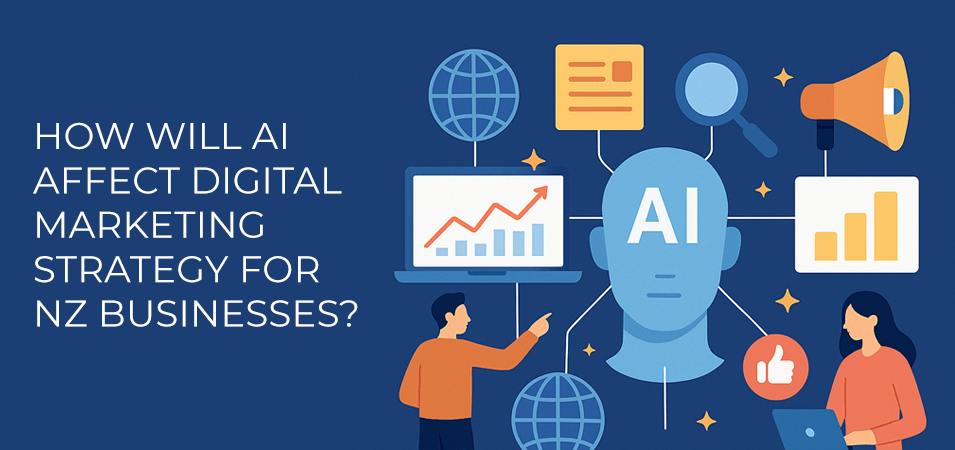
How will AI affect digital marketing strategy for New Zealand businesses?
The digital marketing landscape is changing faster than ever before. If you’re running a business in New Zealand, you’ve probably heard plenty about artificial intelligence (AI) by now.
Perhaps you’ve tried ChatGPT or seen AI-generated images that look so much like real photos that they are hard to spot. Maybe you’ve seen news stories about AI improving cancer detection in medical scans or self-driving cars beginning to roam our roads (San Francisco has had self-driving taxis for years, and just when this might come to New Zealand is hotly debated). These are just a few visible signs of a massive shift happening beneath the surface of the internet and society more generally.
For Kiwi business owners, understanding these changes isn’t just interesting—it’s becoming essential. The way customers find businesses online is transforming, and staying ahead means that digital marketing strategies will also be adapting.
This article aims to sidestep all the hype and hyperbole and explain what AI really means for your business’s online presence in simple terms. We’ll explore how search engines are changing, what still works in SEO, and what steps you can take today to position your business for success.
Key Takeaways
- AI is rapidly transforming digital marketing, but SEO remains crucial for driving website traffic
- Google continues to prioritise user experience, site speed, and mobile optimisation
- Search results are evolving to include AI-generated content, changing how people find businesses online
- Local SEO is becoming even more important for small and medium New Zealand businesses
- Working with digital marketing experts who understand AI trends provides a competitive advantage
- New Zealand businesses can benefit from embracing these technologies rather than waiting to follow
Table of Contents
- What is AI and How is it Changing Digital Marketing?
- The Changing Landscape of SEO
- Why SEO Still Matters More Than Ever
- How Search Results Are Evolving
- Winning at Local Search in the AI Era
- Why Expert Digital Marketing Guidance is Crucial Now
- Common Questions About AI and Digital Marketing
- The Path Forward for Kiwi Businesses
What is AI and how is it changing digital marketing?
Artificial intelligence, at its simplest, refers to computer systems that can perform tasks that normally require human intelligence. This includes recognising patterns, learning from experience, and making decisions.
You’re already using AI every day, perhaps without realising it. When your photo app automatically creates themed collections of your holiday snaps, or when facial recognition unlocks your smartphone, that’s AI working in your daily life.
The recent explosion in AI capabilities has been dramatic. Just a few years ago, AI that could write coherent paragraphs or create realistic images seemed like science fiction. Today, these tools are freely available to anyone with internet access.
For digital marketing, this rapid advancement is causing ripples across every aspect of the online world. AI is now writing content, designing graphics, analysing customer behavior, and even predicting what marketing strategies will work best.
Search engine optimisation (SEO) is particularly affected. The way people find information online is shifting, with AI-powered chatbots and voice assistants often providing answers directly instead of sending users off to websites.
This doesn’t mean your business website is becoming obsolete—far from it. In fact, having a high-quality website is becoming even more crucial. As AI systems scan the internet for trustworthy information, websites that stand out in their industries with good content will become the primary sources that AI draws from and recommends to users. Your website is no longer just your digital storefront—it’s now the foundation that informs how AI represents your business to potential customers. The rules of the game are changing, and businesses that adapt quickly will have an advantage.
The changing landscape of SEO
For nearly two decades, Google has been the undisputed gateway to the internet. This dominance created a relatively stable environment for SEO—business owners knew that ranking well on Google was the primary goal of any digital marketing strategy.
The basic principles remained consistent: create quality content, gain credible backlinks, and ensure your website works well technically. While Google’s algorithms constantly evolved, these fundamentals didn’t change dramatically.
Now, AI is disrupting this stability. People are increasingly turning to alternatives to find information and discover businesses.
Social media platforms like Instagram and TikTok have become search engines in their own right, especially for younger consumers. Instead of Googling a restaurant, they might check Instagram to see photos of the food or TikTok for video reviews.
Even more significantly, AI chatbots like ChatGPT are emerging as potential competitors to traditional search engines. When someone can ask a chatbot for recommendations on “the best plumber in Christchurch” or “the best bakery in Burnside” and get an immediate, conversational response, they might skip Google entirely.
This shift doesn’t mean Google is disappearing any time soon—it still processes billions of searches daily. But it does mean the search landscape is becoming more fragmented, requiring businesses to maintain visibility across multiple platforms.
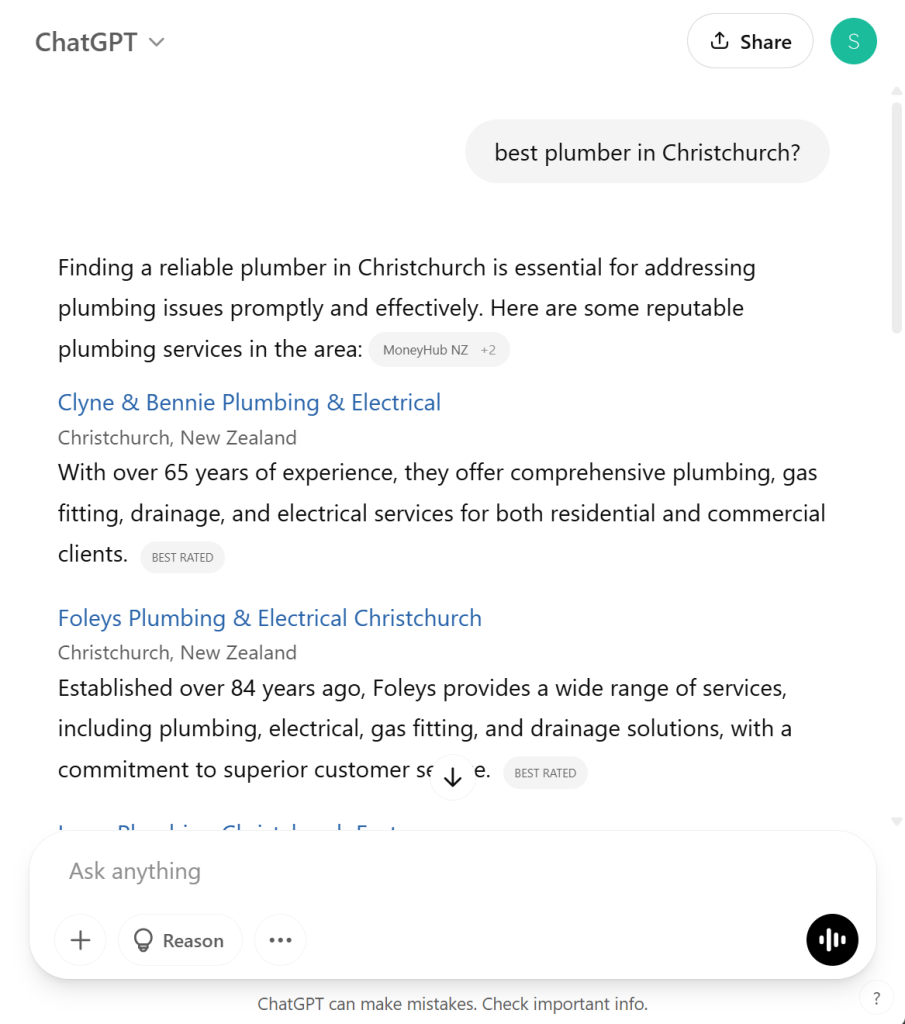
ChatGPT couldn’t access the internet when first released; live web browsing was added for GPT-4 users in mid-2023.
Why SEO still matters more than ever
Despite these changes, SEO remains absolutely vital for your business. Recent data shows that organic search still drives more than half of all website traffic (As of 2025, studies indicate about 53%), far outperforming other channels like social media or paid advertising.
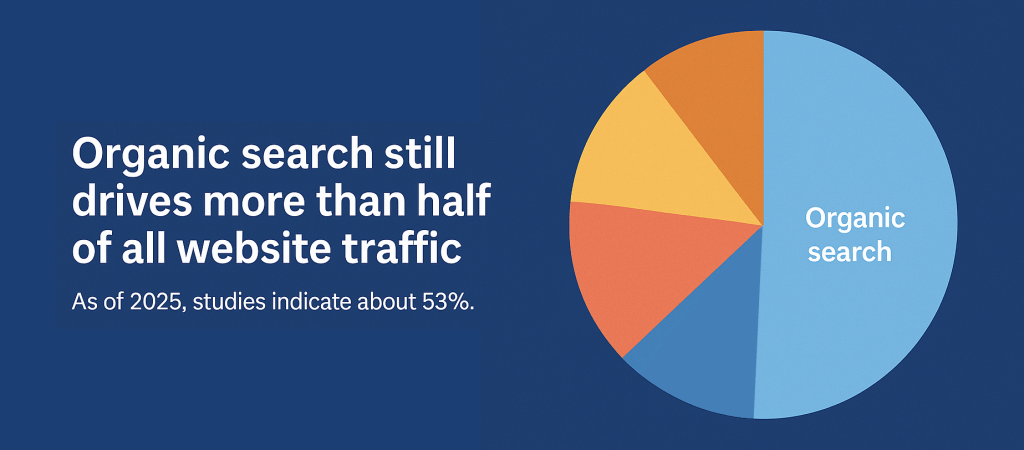
This means that understanding what Google values in a website continues to be crucial for online success. And what Google values most is user experience.
When someone clicks on your website in search results, Google tracks whether they stay and engage or quickly leave (known as “bouncing”). Websites that provide a good experience rank higher.
Key factors include:
Site speed: Nobody likes waiting for slow websites to load. On mobile devices especially, users will abandon sites that take more than a few seconds to appear. Google knows this and prioritises faster websites.
Mobile optimisation: Most web browsing happens on phones now, not computers. Your site needs to look good and function well on small screens. This means readable text without zooming, buttons large enough to tap easily, and no horizontal scrolling.
Content quality: Google has sophisticated ways to determine if your content actually answers visitors’ questions or solves their problems. Thin, unhelpful content won’t rank well.
At Strategus, we specialise in optimising these technical aspects of your website. Our team ensures your site loads quickly, works perfectly on mobile devices, and provides the experience that both users and Google expect.
While we must keep an eye on emerging trends, the current reality is that Google still drives most business discovery online. Investing in solid SEO fundamentals gives you the foundation needed to thrive regardless of how the landscape continues to evolve.
How search results are evolving
If you’ve used Google recently, you’ve probably noticed changes in how search results appear. The traditional “ten blue links” format (do you even remember this!) is increasingly being replaced by more dynamic results.
Google is now integrating AI-generated summaries at the top of many search results. These “AI Overviews” attempt to answer your question directly without you needing to click through to a website.
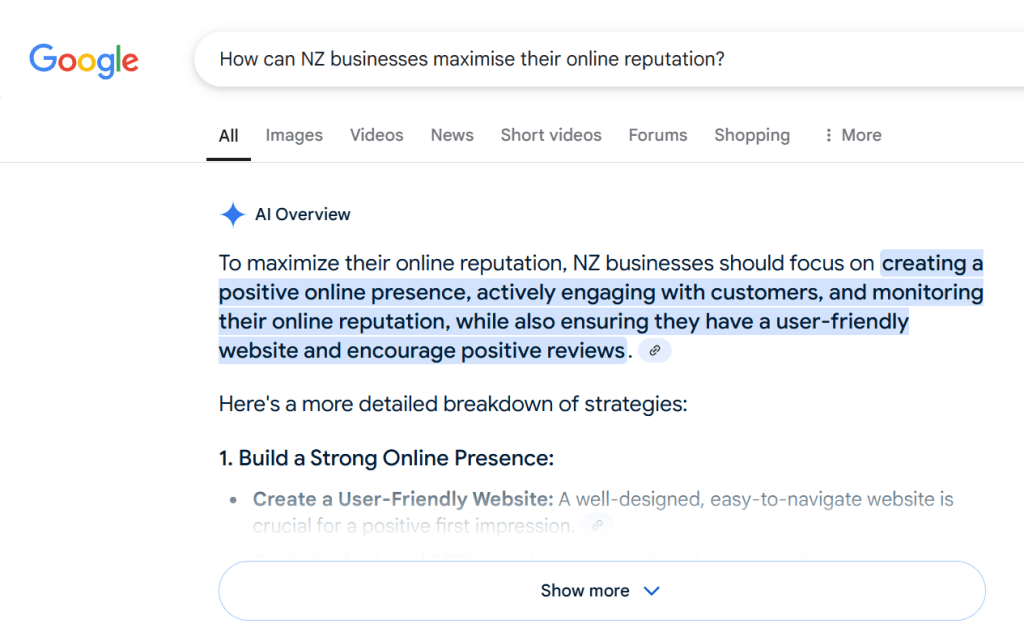
AI Overview at top of Google Search Results
This is part of Google’s response to the threat posed by AI chatbots. By incorporating AI directly into search results, Google hopes to keep users on its platform rather than seeing them migrate to alternatives.
Other search engines are following suit. Bing has partnered with OpenAI to integrate ChatGPT functionality, while smaller players like DuckDuckGo and Brave are developing their own AI features.
For business owners, these changes present both challenges and opportunities:
The challenge is that these AI summaries may answer users’ questions so effectively that they never click through to your website. This “zero-click search” phenomenon has been growing for years and is accelerating with AI integration.
The opportunity lies in becoming one of the sources that these AI systems draw from, with links to source websites occuring within the AI overview panel. When Google’s AI creates a summary, it’s using information from websites it trusts. By focusing on creating authoritative, high-quality content, your business can become one of these trusted sources.
This reinforces the importance of the SEO fundamentals we discussed earlier. Sites that load quickly, work well on mobile, and provide genuinely helpful content are more likely to be cited by AI systems, keeping your business visible even as search evolves.
Winning at Local Search in the AI era
For small and medium businesses in New Zealand, local search has always been particularly important. When someone searches for “café near me” or “hairdresser in Spreydon,” you want your business to appear.
The good news is that AI developments may actually enhance local search rather than disrupt it. AI systems are getting better at understanding local context and user intent, potentially making it easier for nearby customers to find relevant local businesses.
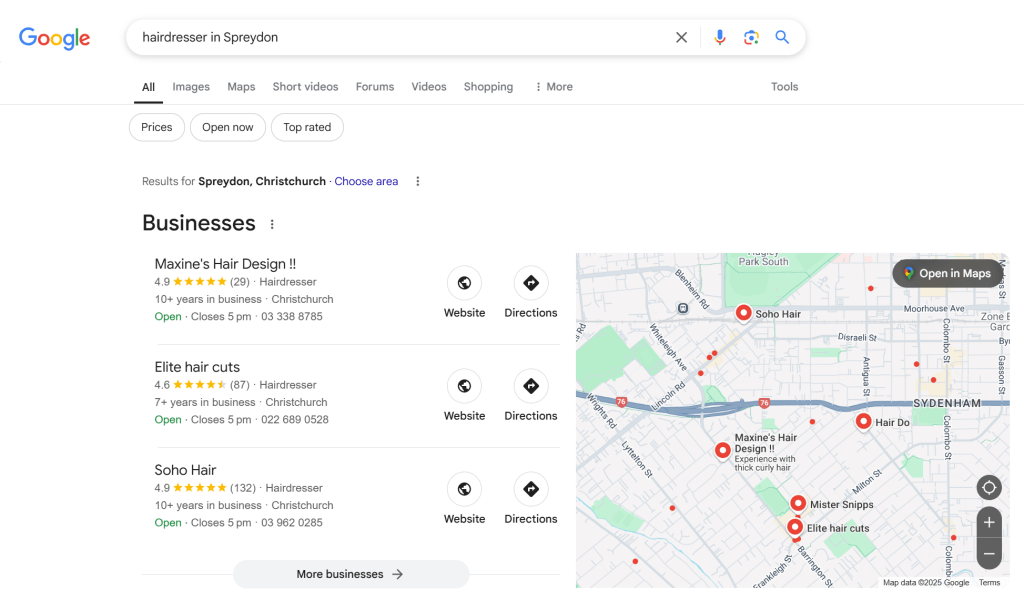
Have you considered the importance of the way your business appears in Google’s local search results?
Here at Strategus, we excel at optimising these crucial local search elements for our clients:
Google Business Profile Management: We ensure your Google Business Profile (formerly Google My Business) is not just complete but compelling. Our team maintains your profile with accurate hours, professional photos, comprehensive service listings, and up-to-date contact information. We also create regular posts about your specials or events to keep your profile fresh and engaging.
Local Keyword Strategy: Our content specialists craft website content rich with location-specific terms tailored to your service areas. For businesses serving multiple regions, we develop dedicated location pages with relevant local information that connects with customers in each area you serve.
Review Management: We implement systems to encourage your satisfied customers to leave positive reviews and develop response strategies for all feedback. Our approach to review management recognises that AI systems increasingly consider review sentiment when recommending businesses to potential customers. We then make sure your website displays these endorsements for all prospective customers to see!
Structured Data Implementation: Our technical specialists implement the complex structured data coding that helps search engines and AI systems properly understand specific information about your business, including your address, hours, and services. This technical foundation ensures your business information is interpreted correctly across all search platforms.
As AI becomes more deeply integrated into search, these local SEO practices that we’ve mastered will only grow in importance. Search results are becoming increasingly targeted and personalised based on user location and behavior, making our locally-focused approach more valuable than ever for our clients in Christchurch, greater Canterbury, and throughout New Zealand.
Why expert digital marketing guidance is crucial now
During times of significant change, there’s often a temptation to pull back and wait to see how things develop. For digital marketing, this would be a mistake.
Professional digital marketers like our team at Strategus are constantly monitoring these AI developments, testing new approaches, and adapting strategies accordingly. We’re seeing which changes actually impact results and which are just hype.
New Zealand businesses have historically been somewhat conservative when it comes to adopting new technologies, often waiting to see how trends play out overseas before investing. While this caution can sometimes be wise, with AI and digital marketing it risks falling behind competitors.
Countries like the USA and China are rapidly embracing AI for business applications. By learning from their experiences while applying knowledge of our unique local market, New Zealand businesses have an opportunity to gain a competitive edge.
Working with digital marketing experts now doesn’t mean rashly jumping on every new trend. Instead, it means having partners who can help you:
- Separate genuine opportunities from temporary fads
- Maintain strong fundamentals while strategically testing new approaches
- Adapt quickly when changes do impact your business visibility
- Stay ahead of local competitors who may be taking a “wait and see” approach
The businesses that thrive during this transition will be those that neither panic nor ignore the changes, but instead work with knowledgeable partners to navigate them strategically.
Common questions about AI and digital marketing
Q: Will AI completely replace traditional SEO?
A: No. While AI is changing how people search, the fundamentals of creating quality content and providing good user experiences remain the same. At Strategus, we’re continuously adapting our SEO strategies to evolve with these changes while maintaining focus on the core elements that drive results.
Q: How are you incorporating AI tools into your marketing services?
A: We’re extremely selective about AI integration. We won’t adopt any new AI tool unless it demonstrates tangible, measurable benefits for our clients. Strategus is not interested in novelty for novelty’s sake, or implementing technologies simply because of industry hype.
Q: How is AI affecting your approach to paid advertising?
A: We’re currently testing new AI-powered features in Google Ads and Meta platforms to optimise ad placements and bidding strategies. We’re monitoring results to determine if there are targeting and efficiency improvements. This is all with the aim to stretch your advertising budget further while improving conversion rates through more precise targeting.
Q: How will you ensure my website remains relevant as AI provides direct answers?
A: We position your website as an authoritative source that AI systems will draw from. Our content strategy creates the comprehensive, accurate information that AI relies on, while our technical optimisation ensures your site is properly understood by both traditional search and AI systems.
Q: How quickly are you adapting your digital marketing approaches for AI?
A: We maintain a balanced approach—implementing proven strategies immediately while testing emerging techniques. Our team monitors AI developments, allowing us to make data-driven recommendations specific to your business needs rather than chasing every new trend.
The path forward for Kiwi businesses
The digital marketing landscape is undoubtedly changing, but this represents an opportunity for forward-thinking New Zealand businesses. By understanding how AI is reshaping search and customer behavior, you can position your business to thrive rather than merely survive.
The key is balance—maintaining strong fundamentals while strategically exploring new possibilities. Your website still needs to load quickly, work well on mobile devices, and provide valuable information. Your Google Business Profile still needs to be complete and accurate. Your content still needs to answer customer questions.
New Zealand’s business culture values authenticity and personal connections. These qualities remain important even as technology evolves. In fact, they may become even more valuable as differentiators in an increasingly automated world.
By combining our traditional strengths with thoughtful adoption of new technologies, New Zealand businesses have a unique opportunity to create digital marketing approaches that are both innovative and genuinely helpful to customers.
The businesses that will succeed aren’t necessarily those with the biggest budgets or the most advanced technology. They’re the ones that understand their customers, provide real value, and remain adaptable as the digital landscape continues to evolve.

